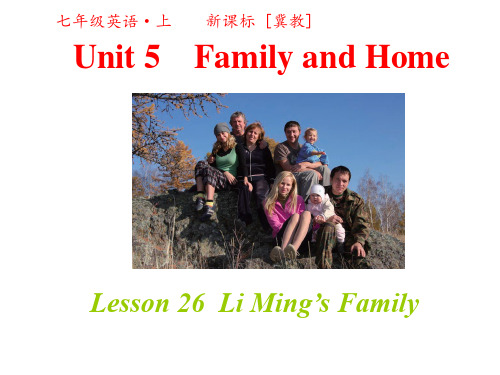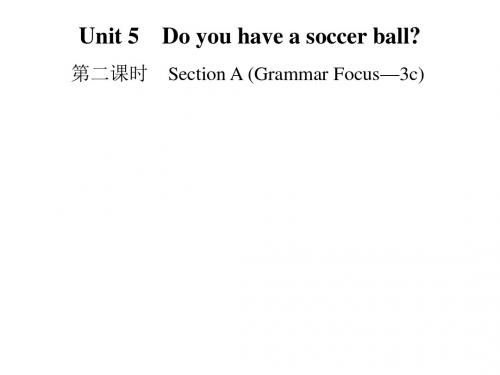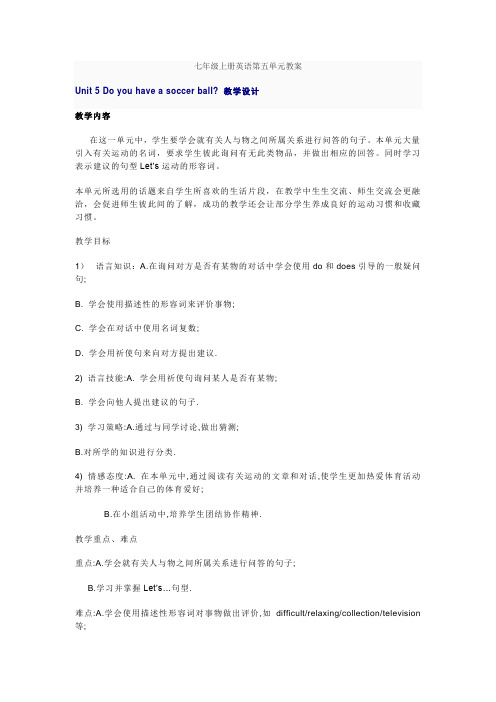七年级上册英语第五单元第二课时
Unit5.2 Do you have a soccer ball?(Section B)-七年级英语人教版(上册)(解析版)

Unit 5 Do you have a soccer ball?课时2 Section B(满分: 100分时间: 40分钟)一、根据句意及汉语提示填写单词。
(共5小题,每小题2分,共计10分)1. —Let’s play soccer.—No. That sounds ________ (无聊的).2. English is ________ (难的) for me.3. Dad, can I ________ (观看) TV now?4. I think playing basketball is ________ (有趣的).5. Let’s play tennis. It’s ________ (轻松的).【答案】1. boring2. difficult3. watch4. interesting/fun5. relaxing二、连词成句。
(共5小题,每小题2分,共计10分)1. a, I, tennis, have, ball, don’t__________________________________________.2. Bill, a, does, ping-pong, have, bat_________________________________________?3. go, basketball, let’s, to, the, watch, game__________________________________________.4. so, for, volleyball, boring, is, me__________________________________________.5. soccer, bed, Bob’s, the, under, is, ball__________________________________________.【答案】1. I don’t have a tennis ball2. Does Bill have a ping-pong bat3. Let’s go to watch the basketball game4. V olleyball is so boring for me5. Is Bob’s soccer ball under the bed三、根据汉语意思完成句子,每空一词。
冀教英语七年级上第五单元第二课时

together.LciloMseing is
Байду номын сангаасto his
mother.His mother is a dkoinctdor.She is
very ready.She is always
to
helpwoothrkerss.Li Ming
hard at school.Hfeulnoves his
family.They always have
together.
Read the text first,then ask at least 3 questions.After a while,you can ask anyone in the class to answer your questions.
Group 1: (1)Who is Jing?
2.Dad,can youplay football with me? 3.John’s father is abusinessman . 4.Let’s go to the parktogether . 5.What do you often do onweekends ?
Homework
1.Recite the words and expressions and read the passage after class. 2.Write a short passage about your family.
七年级英语·上 新课标 [冀教]
Unit 5 Family and Home
Lesson 26 Li Ming’s Family
Li Ming’s family
Words and phrases
businessman weekend together others hard
2018秋人教版七年级英语上册课件:unit5 第二课时 Section A (Grammar Focus—3c)(共12张PPT)

Do I/you/we/they have a ball? 3.疑问式 我/你(们)/我们/他们有球吗? Does he/she/it have a ball? 他/她/它有球吗? Yes,I/you/we/they do. 4.肯定答语 是的,我/你(们)/我们/他们有球。 Yes,he/she/it does. 是的,他/她/它有球。
a cat. They like it very
much. A.have C.there is ( B.has D.there are
A
)2.I A.don't C.isn't
have a red jacket. B.am not D.doesn't
A.a C.the
B./
【解析】play+球类名词,中间不能用冠词。
Unit 5
第二课时
Do you have a soccer ball?
Section A (Grammar Focus—3c)
实义动词 have/has 的一般现在时 have/has 的基本意思是“有,拥有,占有”,表示一种 所属关系,其主语一般是人;有时也可以是物。
have/has 的句式构成如下: I/You/We/They have a ball. 1.肯定式 我/你(们)/我们/他们有一个球。 He/She/It has a ball. 他/她/它有一个球。 I/You/We/They don't have a ball. 2.否定式 我/你(们)/我们/他们没有球。 He/She/It doesn't have a ball. 他/她/它没有球。
—Yes, she does . 13.We don't have (not, have) oranges now.
七年级上册英语第五单元教案

七年级上册英语第五单元教案Unit 5 Do you have a soccer ball? 教学设计教学内容在这一单元中,学生要学会就有关人与物之间所属关系进行问答的句子。
本单元大量引入有关运动的名词,要求学生彼此询问有无此类物品,并做出相应的回答。
同时学习表示建议的句型Let’s运动的形容词。
本单元所选用的话题来自学生所喜欢的生活片段,在教学中生生交流、师生交流会更融洽,会促进师生彼此间的了解,成功的教学还会让部分学生养成良好的运动习惯和收藏习惯。
教学目标1)语言知识:A.在询问对方是否有某物的对话中学会使用do和does引导的一般疑问句;B. 学会使用描述性的形容词来评价事物;C. 学会在对话中使用名词复数;D. 学会用祈使句来向对方提出建议.2) 语言技能:A. 学会用祈使句询问某人是否有某物;B. 学会向他人提出建议的句子.3) 学习策略:A.通过与同学讨论,做出猜测;B.对所学的知识进行分类.4) 情感态度:A. 在本单元中,通过阅读有关运动的文章和对话,使学生更加热爱体育活动并培养一种适合自己的体育爱好;B.在小组活动中,培养学生团结协作精神.教学重点、难点重点:A.学会就有关人与物之间所属关系进行问答的句子;B.学习并掌握Let’s…句型.难点:A.学会使用描述性形容词对事物做出评价,如difficult/relaxing/collection/television 等;B.学会使用第三人称单数的一般疑问句及回答做对话.课时安排第一课时Section A1a-1c第二课时Section A2a-4第三课时Section B1a-2c第四课时Section B3a-4PeriodOne课前准备教师:准备表格、铅笔、格尺或橡皮。
学生:调查。
教学设计Step One:Learn the new words.1. Present the key vocabulary.(Show a basketball to the class.)T: What’s this in English?S1: It’s a basketball.T: Yes,you are right. Read after me.B-A-S-K-E-T-A-B-L-L,basketball.Ss: B-A-S-K-E-T-A-B-L-L,basketball.(Show the students other objects. Teach the new words “tennisracket,ping-pong ball,volleyball,basketball” in the same way. And then showstudents the picture of television and teach it.)T: Read the words together twice.Ss: …T: Ask and answer in pairs with these things. Use the drill“What’s this in English?” and “Where is the..?”2. Look at the words in 1a and match the wordswith the things in the picture.T: Number 1 is (c ) ,tennis racket. What’s Number 2 Match them.3. Ask one student to show the answers and checkthem.Step Tw Present the structures.1. Present these questions and answers.(Point to a student who has a pen or a pencil case.)T: Do you have a pencil case?S1:Yes, I do. (Nod your head yes)T: Do you have a computer game?S1: No, I don’t. (Shake your head no)2. Practice the drill “Do you have a …?” inpairs. You can use your school things and these balls.Look at the model, thenpractice like this.Model:Sa: Do you have a backpack?Sb: Yes, I do. Do you have a soccer ball?Sa: No, I don’t. I have a volleyball.(Students work in pairs.)Step Three: Listening practice.T: Look at the four items of 1b in the pictures. Listen to theconversati on.(Play the recording of 1b the first time.Students only listen.)T: Listen to the conversation and circle the words you hear.(Play the recording again.)T: Check their answers.S:…Step Four: Practice the conversations.1. Read the conversations in 1c.(Ask students to repeat.)2. Look at the picture in 1a and practice theconversation with each other in pairs.S1:Do you have…?S2:Yes, I do.S1:Do you have a …?S2:No, I don’t.3. Work in groups of four and use the picture topractice the similar conversations with the new words.(television,basketball,baseball bat, soccer ball, volleyball,television)T:Ask and answer the questions as many as you can.S1:Do you have a … ?S2: …S1: …S2: …Step Five: Task.T: Make a survey about “ What kind of balls do the students have?”We want to have a ball game. But we don’t know what kind of balls you have.Please ask your classmates in the group what balls he/ she has. Then write downthe information in the chart.1.Fill in the chart using the structure and models on the screen.Structures:Do you have a …? Yes, I do./ No, I don’t.Whatballs do you have?Ihave a …Example:S1: Do you have a tennis racket, Tom?S2: No, I don’t.S1: What balls do you have?S2: I have basketball and football.S1: What about you?S3: …2.Choose one student from each group to report about his or hergroup. Report like this:She or he likes… One of them has a … But two ofthem have… Step Six: Homework.Make a survey about your parents’ collection.Unit 5 Do you have a soccer ball ?PeriodTwo课前准备教师:设计表格,准备录音机及多媒体课件。
外研七年级英语上册Module5 unit2 课件(共26张PPT)

合作探究
----四人小组分享你的一天!
… What about you
合作探究
get up
6:00 in the morning
have breakfast go to school have classes have lunch play… go home have dinner
6:30 7:00 8:00 12:00 4:00 in the afternoon 4:40 6:30
…
Hi! I’m _____. I study in_______
________________________________
________________________________
精讲点拨
1. I get up at half past seven in the morning and have breakfast.
我早上7点半起床,然后吃早餐。 have是英语中常见的一个动词,和不同的 词搭配有不同的意思。 have lessons 上课 have dinner 吃饭 have a rest 休息 have a look 看一看 have a good time 玩得愉快
Exercise
1、_____dinner
get up
2. 课间休息
have a break
3. 去上学
go to school
4. 吃早饭
have breakfast
5. 喝水
drink water
6. at half past ten
在十点半
7. go to bed
去睡觉
8. go to the playground
去操场
年人教版七年级英语第五单元2ppt课件完整版

5. 以动词let开头的祈使句,表示向别人提 建议,意思是“让……做……吧”。 基本结构为:let sb. do sth.,表示 “让某 人做某事”,表示说话人的建议。其中sb. 可由名词或代词宾格来充当,其后的动 词一定要用动词原形。 Let me do it. 让我来做吧。 Let him guess. 让他猜一猜。
baseball
baseball bat
ping-pong ball
ping-pong bat
tennis
二、 句型转换 1. Do you have a map? (作肯定回答) 2. Do you have an English dictionary? (作否定回答) 3. Does Linda have an eraser? (作肯定回答) 4. Does he have a volleyball? (作否定回答) 5. I have a nice ping-pong bat. (用she来代替I) ______ _______ a nice ping pong bat.
a
f
c
e
d
b
1a
Match the words with the things in the picture.
Listening
Listen and circle the words your hear.
1b
ping-pong bat soccer ball volleyball ping-pong ball
6. let’s是let us 的缩写形式,意思为“咱们一起做某事吧”,通常表示建议、请求或命令。 肯定回答:一般用“OK”,“All right”,“Yes, let’s …”; 否定回答:一般用“Sorry, I …” 。如: — Let’s go! 让我们走吧! — OK. 好吧。 Let’s look at the blackboard. 让我们看黑板吧。
人教新目标七年级英语上册Unit 5(第2课时)课件
A: ____ you have a
A: _____ he have a
baseball?
ping-pong bat?
B: Yes, I ______.
B: Yes, he _____.
A: Great! I have a bat. I think he has a
Let's play!
pin词填入表格中正确的位置。
I he they you we she it Eric
do
does
I they you we he she it Eric
一、目标导学
1. 熟记Grammar Focus里的重点句型。 2. 掌握play/well/sound等重点单词的用法。
二、自主探究
B: Yes, they __d_o_.
They have two basketballs. A: Well, let's play basketball. B: That sounds good.
五、巩固训练
基础题 — 单项选择
1. I ___C___ a soccer ball and my sister ______ a volleyball.
B: Yes, he _d_o_e_s_.
A: Great! I have a bat. I think he has a
Let's play!
ping-pong ball,
too.
A: Hmm... let's ask.
A: _D__o_ your
friends have a basketball?
— ___________.
A. That sounds well B. That's sound good C. That sounds good D. That’s sounds well
【精选】人教版七年级上册英语Unit5第五单元优秀教案
Unit 5 Do you have a baseball?第一课时Section A(1a1c)【学习目标】1.重点单词:do,does,have,tennis,ball,pingpong,bat,soccer,volleyball,basketball2.重点短语:tennis ball,pingpong ball,soccer ball,baseball bat 3.重点句式:—Do you have a pingpong bat?—Yes,I do.—Do you have a pingpong ball?—No,I don't.【学习重点】1.用have对物品所属提问和回答2.助动词do和does的用法【学习难点】1.用have对物品所属提问和回答2.助动词do和does的用法【自主学习】一、预习课本P25新单词并背诵,完成下面的汉译英。
1.有____________ 2.网球____________3.球____________ 4.乒乓球____________5.球拍____________ 6.足球____________7.排球____________ 8.篮球____________二、认真预习1a,1b,1c,找出下列短语和句型。
1.网球____________ 2.乒乓球____________3.足球____________ 4.球棒____________5.—你有乒乓球拍吗?—是的,我有。
6.—你有一个乒乓球吗?—不,我没有。
【课堂导学】Step 1情景导入(Show some pictures of different kinds of balls)T:Do you like sports?What kind of balls do you like?I like ball games.And I have many balls.Do you know their names?Today we will learn how to say the names of the balls in English.环节说明:由贴近学生日常生活的体育运动为切入点,引起学生的学习兴趣。
七年级英语上册Unit 5Section A(第二课时)教案人教新目标版
精品基础教育教学资料,请参考使用,祝你取得好成绩!Unit 5 Do you have a soccer ball?第二课时 2d-3c Grammar Focus教学目标1.Get the students to learn how to greet people.2.Teach the words let, us. Get the students to know the full form of let’s .3. Get the students to learn to say Let’s play a soccer ball.教学内容New words: hey, let, us, let’s=let us, go, we, late, has, get, great, play, sound — Do you have a ping-pong ball?— Yes, I do.— Do you have a ping-pong bat?—No, I don’t.—Does he have a tennis ball?—Yes, he does. / No, he doesn’t.—Do they have a basketball?—Yes, they do .No, they don’t.教学过程I. Warming- up and revisionSing ABC song.Greeting (Say hello between the teacher and the Ss)Divide the class into Group A and B. Draw two baby birds on the blackboard as their symbols, tell the students that each time they answer questions right, they can get one or more points for their group and draw one or more clouds below the ir bird, at the end of the class, the group which gets more clouds wil l be the winner today. Say, “One, two, three!” Get the whole class sit straight, thus announce the beginning of the competitionReview introductionPlay the “Word train” game. Get a group of students ask and answer questions one by one.T: Good morning. I’m Diana. Do you have a ping-pong ball?S1: Yes, I do.(Then S1 turn around and greet S2 in the same way.)Review :1.球类,及球拍有关的单词。
Unit5课时2SectionA(2a-2e)分层作业新人教版七年级英语上册
Unit5Fun Clubs第二课时分层作业夯基达标一、单词拼写1.My grandpa enjoys watching(新闻)on TV every night.2.Beethoven is a(有音乐天赋的)pianist.He is well-known all over the world.3.In China many children begin to learn to play musical(乐器)when they are young.4.Jim can't remember(准确地)his mother's birthday.5.Tom can(打鼓).6.To improve your reading(能力),you should read more English articles.7.We can p(用颜料画)the picture together.8.Would you like to j(加入)our music club?.9.I have the same(感受)as all my friends.10.If you like singing,you can join the Singing(俱乐部).二、单项选择11.一What can you do,Liz?A.I like sportsB.I am in the art clubC.I can do Chinese kungfuD.I want to join the dance club12.—club are you in?一I'm in the story telling club because I like to tell stories.A.HowB.WhatC.WhenD.Where13.下面句子中哪处发音可以失去爆破?Sharing a problem with others is li ke cutting it in half.A.Shari ngB.wi thC.l ikeD.it14.I don't like cooking,so I join the Food and Drink Club.A.canB.mayC.mustD.can't15.They are very happy to the Music Club.A.join inB.joinC.go in forD.take part in16.根据辅音分类规则,下列选项中不同于其他三个的是oA./t//d/B./f7/v/C./s//z/D./w//u/17.一Do you want to join the music club?—Sorry,I can't play the piano_______the violin.A.butB.andC.soD.or18.下列单词中划线部分发音不同的单词是A.calmB.careC.costD.cent19.Becky often plays________violin fbr an hour every day.A.aB.anC.theD./20.下列哪一组音素全都是清辅音?A./k//s//3/B./s//|7/9/C./t//g//tf7三、补全对话根据对话内容,从方框中选择合适的选项补全对话。
- 1、下载文档前请自行甄别文档内容的完整性,平台不提供额外的编辑、内容补充、找答案等附加服务。
- 2、"仅部分预览"的文档,不可在线预览部分如存在完整性等问题,可反馈申请退款(可完整预览的文档不适用该条件!)。
- 3、如文档侵犯您的权益,请联系客服反馈,我们会尽快为您处理(人工客服工作时间:9:00-18:30)。
1. Ihave two brothers. _____ 2. Jane and you____ a nice dictionary? have 3. Her mother _____ a red car? has 4.His father _____a soccer ball. has 5. Jim and Tomhave _____some cats . 6.Does Jimhave a volleyball? _____ No, he doesn’t. But he has tennis. ____a 1. A: Do you have a Ping-pong bat ? B: No, I don’t. 2. A: Do they have a computer? B: Yes, they do . 3. A: Does she have a tennis ball? B: Yes, she does .
No, no, I don’t.
No, no, you don’t. No, no, they don’t. No, no, she doesn’t. No, no, he doesn’t. Girls
Yes, yes, Mary does.
No, no, Mary doesn’t.
2d. Read the conversation. Then answer the questions.
Cindy: Hey, Helen, let’s go! We’re late! 1. Does Helen have the baseball? Helen: OK. Yes, she does. Cindy: Do you have the baseball? 2. Does Helen have the bat? Helen: Yes, I do. It’s in my bag. Who has it? Cindy: And where’s our baseball bat? No, she doesn’t. Bill has it. Helen: Bill has it. Cindy: Oh, yeah. And do you have your 3. Where is Helen’s jacket? It’s on the chair. jacket? Helen: Oh, no, I don’t. It’s on the chair. Let me get it. Cindy: And your hat, too! Helen: OK, I have my jacket and hat. Let’s go!
Helen
Cindy
Cindy: Hey, Helen, let’s go! We’re late! Helen: OK. Cindy: Do you have the baseball? 2d Helen Cindy Helen: Yes, I do. It’s in my bag. Cindy: And where’s our baseball bat? hey [heɪ] 嘿,喂 Helen: Bill has it. let [let] 允许,让 Cindy: Oh, yeah. And do you have your us [ʌs] 我们(宾格) jacket? let’s = let us Helen: Oh, no, I don’t. It’s on the chair. go [gəʊ] 去,走 Let me get it. we [wi:] 我们(主格) Cindy: And your hat, too! late [leit] 迟到的 Helen: OK, I have my jacket and hat. has [ hæ s] 有(have单数) Let’s go!
Helen
Cindy
Life lies in sports. 生命在于运动。
Do sports every day and you will be healthy and happy!
每天锻炼,健康愉悦!
1、Read and recite 2a/2b (listening). 2、Translate and read 2d 3、Exercise book P36.
A: Does she have anTV ? a apple? B: Yes, she does. /No, she doesn’t. doesn’t = does not
a basketball A: Does he have a soccer ball?? B: Yes, he does. /No, he doesn’t.
get
[get]
去取,得到
我们走吧!
我们迟到了!
Cindy: Hey, Helen, let’s go! We’re late! 你拿了棒球吗? Helen: OK. Cindy: Do you have the baseball? let’s =let us Helen: Yes, I do. It’s in my bag. Bill拿了。 Cindy: And where’s our baseball bat? we’re = we are Helen: Bill has it. Cindy: Oh, yeah. And do you have your let sb. do sth. jacket? Helen: 让我去取吧。 Oh, no, I don’t. It’s on the chair. Let me get it. Cindy: And your hat, too! Helen: OK, I have my jacket and hat. Let’s go!
Let’s enjoy the song and sing together! One song a week.(一起唱:每周一歌)
Section A (2a-2d)
ping-pong ball
-- What’s this in English? baseball ping-pong bat -- It’s a/an… -- How do you spell it? soccer ball -- … tennis ball baseball bat -- Do you have a/an…? -- Yes, I so./ No, I don’t.
3
4
1
2
Listen and fill in the blanks.
Do have (1) – ___ you _____ a soccer ball, Paul? -- ____________. No, I don’t have -- _____ your brother Alan _____ one? Does -- ____________. Yes, he does
(2)– ___, Mike. Hi -- ___, John. Hi basketball -- I want to play _________. Do you _______________? have a basketball -- Yes, I do. -- Great!
(3)– Hi, Sally. (4)– Do you have a ____________, Dale? volleyball -- Hi, Jane. -- ___________. But my brother _____. No, I don’t does -- Sally, this is my friend, Anna. Let’s go and find him. -- Hi, Anna. Nice to meet you. -- Nice to meet you, Sally. 主语my brother是第三人称单数, -- Let’s ____________. Do you have a play tennis have用单数形式has,助动词用 _____________, Jane? does 。第三人称单数有 he, she, tennis ball it, Jack, Maru, my father等。 -- Sorry, I don’t.
I have, you have, they have. She has, he has, Mary has. Do I ,do you ,do they? Does she ,does he ,does Mary?
Yes, yes, I do.
Yes, yes, you do. Yes, yes, they do. Yes, yes, she does. Yes, yes, he does. Boys
× have √ ? × A: Does she a…
B: Yes, she does . /No, she doesn’t .
√he have ×? A: Does a…
√
B: Yes, he does . /No, he doesn’t .
I have, you have, they have. She has, he has, Mary has. Do I ,do you ,do they? Does she ,does he ,does Mary?
basketball
√
× ×
× √
√Байду номын сангаас√
volleyball
2a Listen to the conversation and number the pictures(1-4)
Jane
Dale
3
Paul
4
Mike
1
2
2b Listen again. Match the pictures in 2a with the ball.
Fill in the blanks(选词填空):
have? has?
do? dose? don’t? doesn’t?
